
 i_need_contribute
i_need_contribute

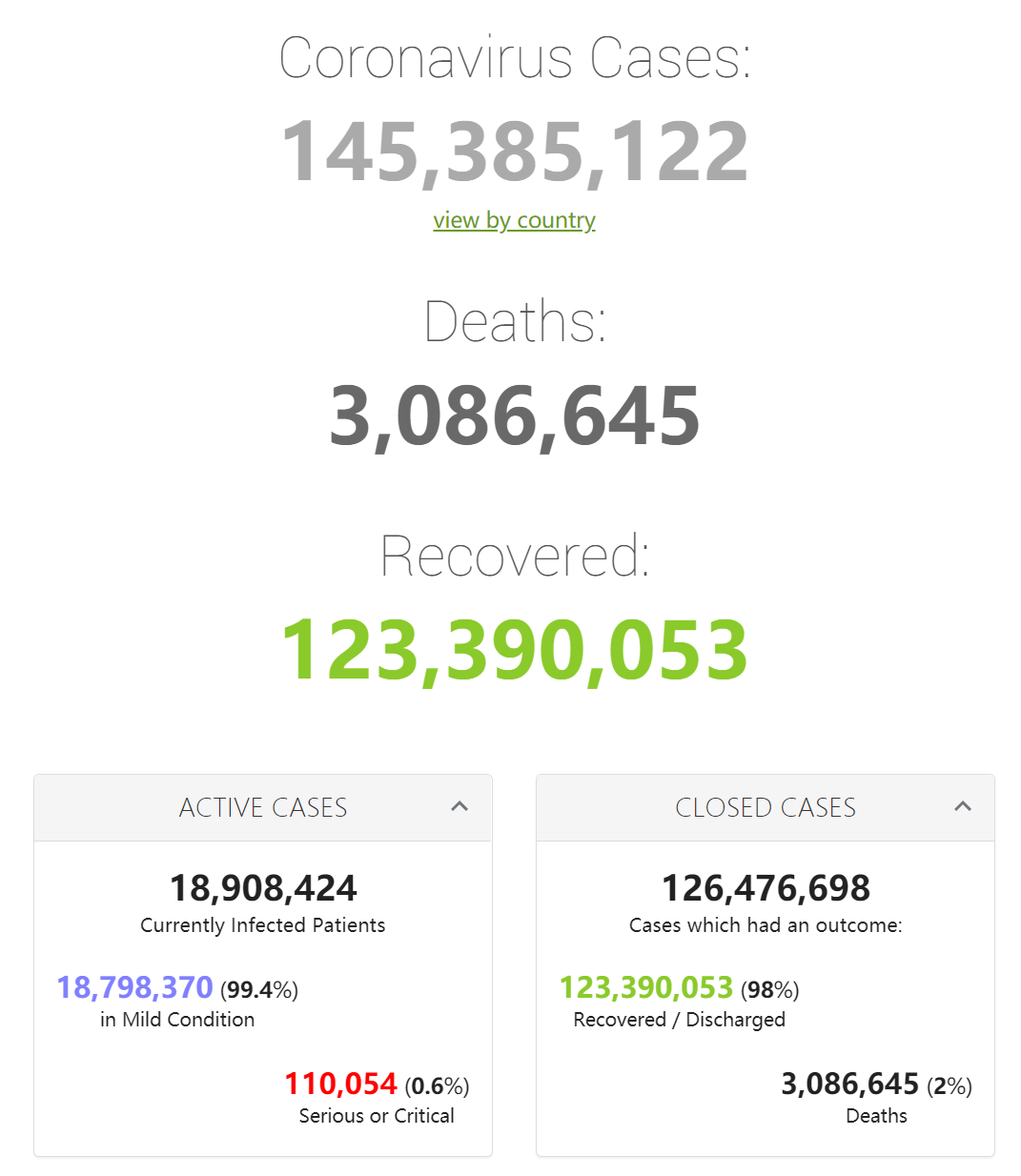
|
Country, |
Total |
New |
Total |
|
World |
145,318,391 |
+885,998 |
3,084,619 |
|
32,669,121 |
+67,070 |
584,226 |
|
|
16,257,309 |
+332,503 |
186,928 |
|
|
14,172,139 |
+49,344 |
383,757 |
|
|
5,408,606 |
+34,318 |
102,164 |
|
|
4,736,121 |
+8,996 |
107,103 |
|
|
4,501,382 |
+54,791 |
37,329 |
|
|
4,398,431 |
+2,729 |
127,345 |
|
|
3,920,945 |
+16,232 |
118,357 |
|
|
3,456,886 |
+10,814 |
77,496 |
|
|
3,238,054 |
+29,382 |
81,693 |
|
|
2,796,768 |
+27,216 |
60,620 |
|
|
2,731,256 |
+12,762 |
64,168 |
|
|
2,720,619 |
+19,306 |
70,026 |
|
|
2,335,905 |
+24,092 |
68,366 |
|
|
2,315,811 |
+4,639 |
213,597 |
|
|
1,990,353 |
+16,235 |
41,266 |
|
|
1,734,606 |
+7,800 |
58,604 |
|
|
1,626,812 |
+6,243 |
44,172 |
|
|
1,612,846 |
+2,951 |
28,835 |
|
|
1,571,348 |
+1,413 |
53,995 |
|
|
1,435,854 |
+9,611 |
17,002 |
|
|
1,155,834 |
+8,370 |
23,822 |
|
|
1,148,320 |
+6,917 |
25,532 |
|
|
1,039,998 |
+2,989 |
26,943 |
|
|
1,010,304 |
+8,450 |
15,128 |
|
|
971,049 |
+8,767 |
16,370 |
|
|
960,169 |
+5,113 |
23,867 |
|
|
837,807 |
+315 |
6,346 |
|
|
832,891 |
+636 |
16,956 |
|
|
778,238 |
+5,857 |
16,698 |
|
|
760,967 |
+3,607 |
26,001 |
|
|
736,074 |
+4,014 |
10,781 |
|
|
697,487 |
+2,097 |
8,474 |
|
|
673,520 |
+2,719 |
6,130 |
|
|
602,494 |
+2,405 |
10,026 |
|
|
546,425 |
+5,291 |
9,764 |
|
|
516,600 |
+1,512 |
7,057 |
|
|
507,938 |
+600 |
8,976 |
|
|
504,872 |
+2,081 |
1,565 |
|
|
409,093 |
+1,055 |
6,869 |
|
|
394,594 |
+1,681 |
15,721 |
|
|
384,688 |
+2,875 |
1,407 |
|
|
378,150 |
+677 |
11,357 |
|
|
365,393 |
+2,550 |
17,965 |
|
|
361,992 |
+314 |
6,198 |
|
|
348,486 |
+1,170 |
2,463 |
|
|
326,395 |
+2,756 |
9,788 |
|
|
316,308 |
+2,885 |
6,738 |
|
|
307,980 |
+2,047 |
4,274 |
|
|
300,264 |
+1,226 |
3,981 |
|
|
297,839 |
+2,893 |
3,483 |
|
|
294,138 |
+2,305 |
10,063 |
|
|
293,061 |
+1,386 |
12,731 |
|
|
292,152 |
+2,365 |
3,117 |
|
|
287,680 |
+1,652 |
3,115 |
|
|
262,935 |
+531 |
3,441 |
|
|
262,766 |
+1,459 |
1,493 |
|
|
260,382 |
+2,676 |
5,633 |
|
|
248,009 |
+618 |
5,668 |
|
|
247,989 |
+1,505 |
3,496 |
|
|
245,761 |
+893 |
2,467 |
|
|
245,310 |
+615 |
4,866 |
|
|
237,985 |
+1,379 |
3,819 |
|
|
235,274 |
+1,776 |
3,125 |
|
|
234,811 |
+745 |
4,187 |
|
|
219,774 |
+872 |
12,914 |
|
|
218,145 |
+1,816 |
7,345 |
|
|
211,399 |
+881 |
3,969 |
|
|
203,359 |
+946 |
4,981 |
|
|
199,980 |
+800 |
407 |
|
|
188,063 |
+1,318 |
1,987 |
|
|
185,278 |
+1,508 |
1,942 |
|
|
175,891 |
+3,290 |
2,160 |
|
|
174,216 |
+533 |
2,936 |
|
|
168,201 |
+1,036 |
614 |
|
|
164,588 |
+100 |
2,061 |
|
|
154,392 |
+904 |
2,560 |
|
|
149,221 |
+603 |
4,595 |
|
|
142,674 |
+13 |
3,206 |
|
|
130,114 |
+134 |
2,364 |
|
|
120,363 |
+189 |
3,181 |
|
|
119,218 |
+436 |
1,120 |
|
|
116,661 |
+735 |
1,808 |
|
|
113,561 |
+578 |
2,088 |
|
|
109,581 |
+444 |
735 |
|
|
98,722 |
+672 |
634 |
|
|
97,967 |
+1,207 |
559 |
|
|
96,187 |
+139 |
1,451 |
|
|
93,006 |
+380 |
1,566 |
|
|
91,928 |
+145 |
777 |
|
|
91,189 |
+70 |
1,240 |
|
|
90,547 |
+6 |
4,636 |
|
|
87,935 |
+384 |
640 |
|
|
85,077 |
+280 |
902 |
|
|
69,523 |
+86 |
805 |
|
|
68,161 |
+154 |
2,089 |
|
|
65,813 |
+209 |
790 |
|
|
59,792 |
+927 |
296 |
|
|
58,542 |
+196 |
2,565 |
|
|
48,113 |
+1,470 |
117 |
|
|
10,469 |
+32 |
95 |
|
|
9,865 |
+74 |
191 |
|
|
2,816 |
+10 |
35 |
Retrieved from: https://www.worldometers.info/coronavirus/
From CNN's Esha Mitra in New Delhi
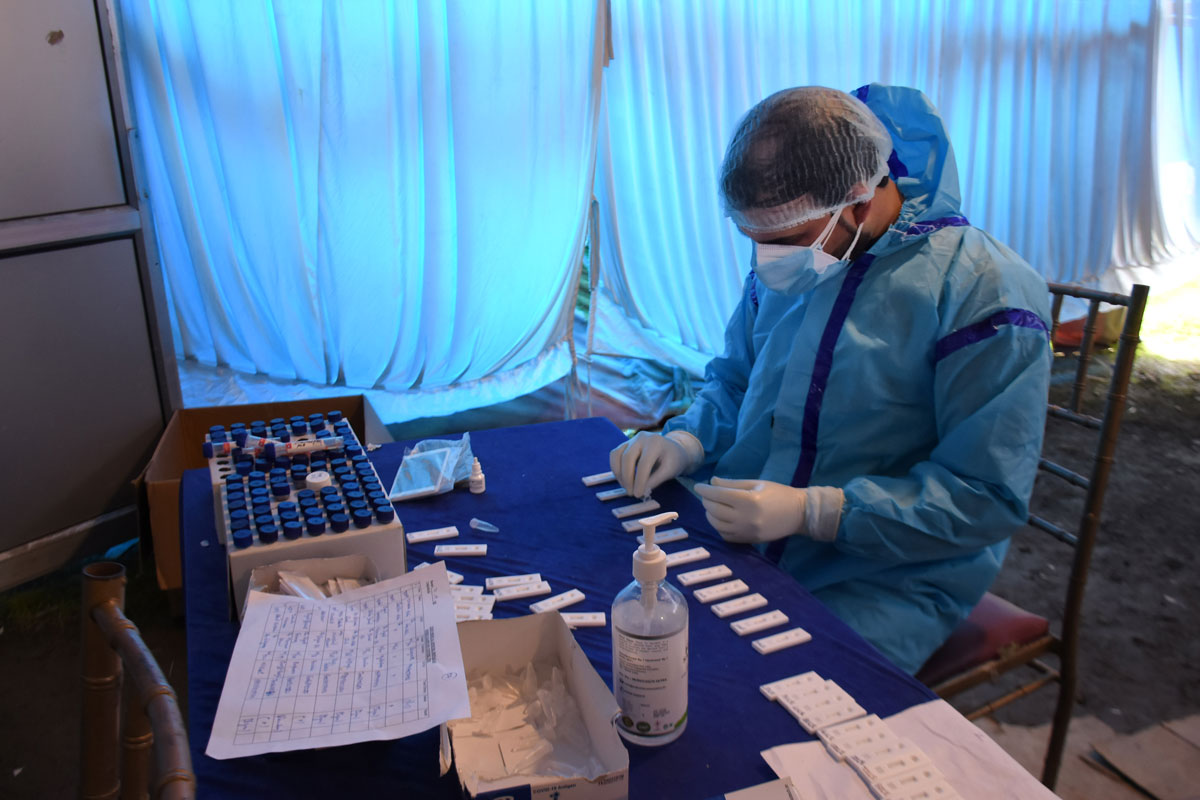
A health worker prepares a Covid-19 test sample at a testing centre in Srinagar, India on April 21. Muzamil Mattoo/NurPhoto/Getty Images
India has reported the highest number of daily coronavirus cases globally for the second day in a row, as the country grapples with a worsening crisis.
On Friday, 332,730 new cases were recorded, bringing India's total to more than 16 million cases, according to a CNN tally of figures from the Indian Ministry of Health. The country has added over 1 million cases in four days.
India also reported its highest single-day death toll since the pandemic began, with 2,263 deaths Friday.
In the capital New Delhi, at least six private hospitals ran out of oxygen Thursday, Delhi's deputy chief minister Manish Sisodia said in a letter to union health ministers.
Even after the central government allocated 480 metric tons of oxygen for Delhi Wednesday, Delhi's advocate informed the city's high court Thursday that the supplies had still not reached the capital.
The Ministry of Home Affairs issued an order asking states not to restrict the movement of medical oxygen. The high court also asked for a special corridor to be created for the movement of oxygen.
As of Friday morning, there were only 25 available ICU beds in the capital, a Delhi government dashboard showed.
Later today, Prime Minister Narendra Modi will be chairing high-level meetings to review the Covid-19 situation in the country.
From CNN's Yoonjung Seo in Seoul
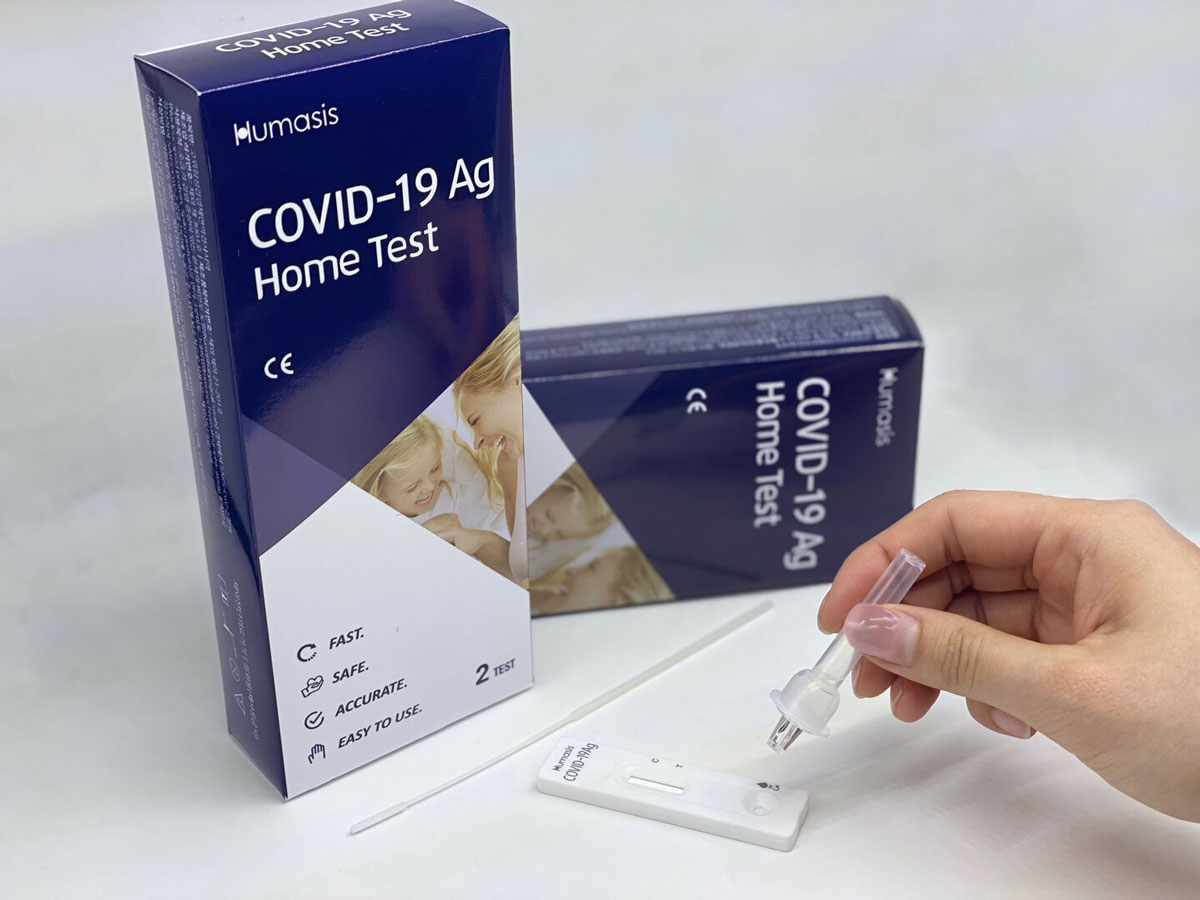
Courtesy Humasis
South Korea's Ministry of Food and Drug Safety granted conditional approval for two locally developed Covid-19 self-testing kits Friday, according to a press release.
The testing kits produced by SD Biosensor and Humasis are already used in European countries including Germany, Switzerland, Holland and Austria. Users should be able to get a result within 15 minutes of testing, but the sensitivity level for the at-home kits is lower than the more widely used PCR-based testing.
The sensitivity rates of the newly approved testing kits are 90% and 89.4% for SD Biosensor and Humasis respectively, according to the Ministry statement.
The two companies will need to provide additional clinical trial test results within three months.
South Korea recorded 797 new coronavirus cases from Thursday, raising the national total of confirmed cases to 117,458, according to the Korea Disease Control and Prevention Agency (KDCA).
As of midnight Friday, more than 2 million people have received their first dose of coronavirus vaccine and 79,151 people were fully vaccinated, KDCA said.
From CNN's Pierre Bairin and Arnaud Siad
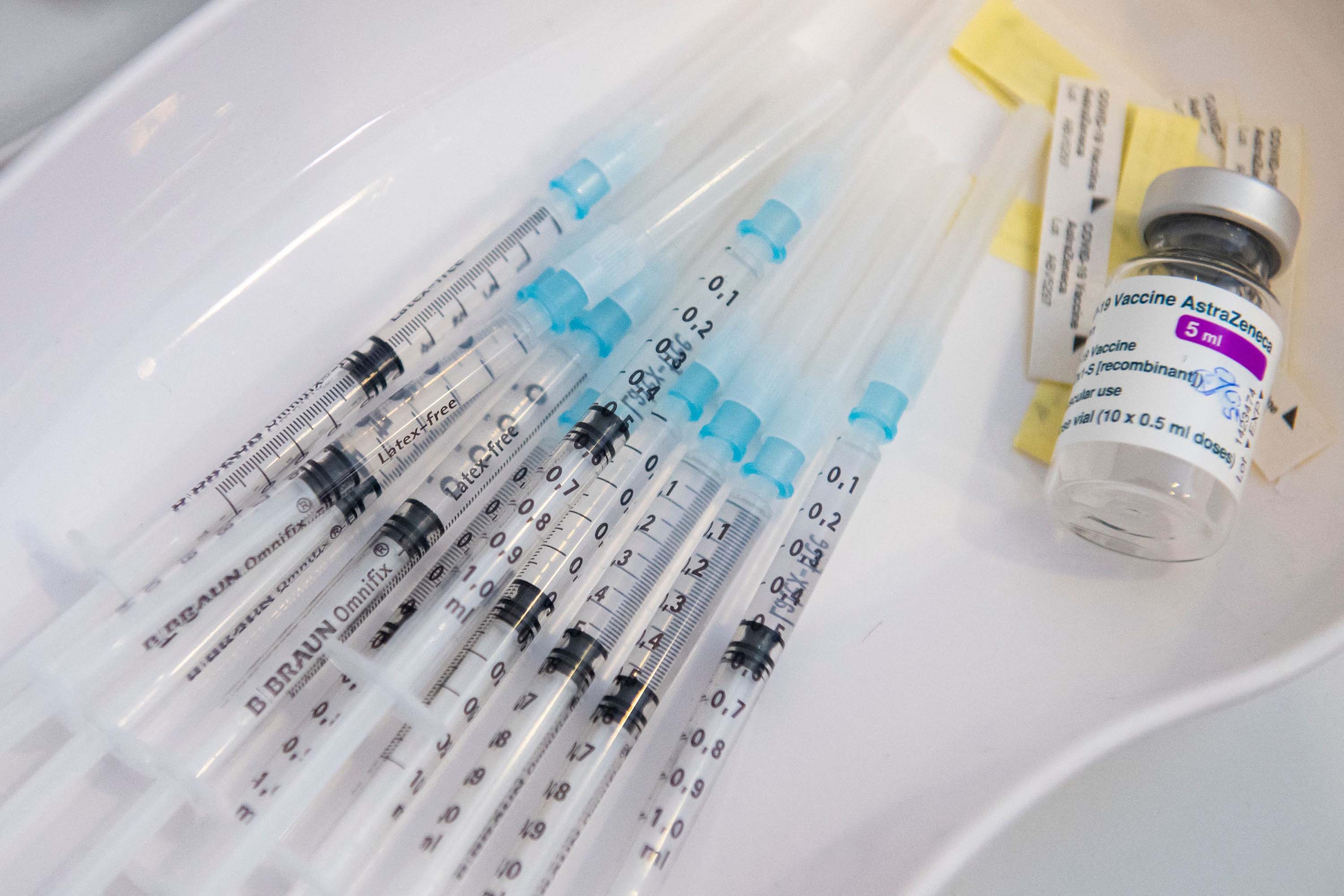
Doses of the AstraZeneca vaccine are seen at a doctor's office in Deisenhofen, Germany, on March 31. Lennart Preiss/AFP/Getty Images
The European Union is declining an option to order an additional 100 million doses of coronavirus vaccine from AstraZeneca, a spokesman said Thursday.
The move follows months of public criticism of the drug maker by European officials.
The European Commission did not exercise the option to buy the doses and the deadline for it has now passed, Commission spokesperson for health Stefan de Keersmaecker said.
The Commission is focusing on getting delivery of the 300 million doses it initially ordered, he said.
"In the first quarter, 30 million doses were delivered, which is less than what was contractually expected. For the second quarter, the contract provided for 180 million doses. The company said it was able to deliver 70 million doses," he said.
European officials have been publicly furious that AstraZeneca has delivered fewer doses than the EU says it ordered, prompting the bloc to impose export restrictions on doses manufactured in the EU. The company has cited delays in production.
The news comes a day after Norway announced that it will send 16,000 doses of the AstraZeneca vaccine to Iceland, according to a statement from the Icelandic Directorate of Health.
From CNN’s Nadine Schmidt in Berlin
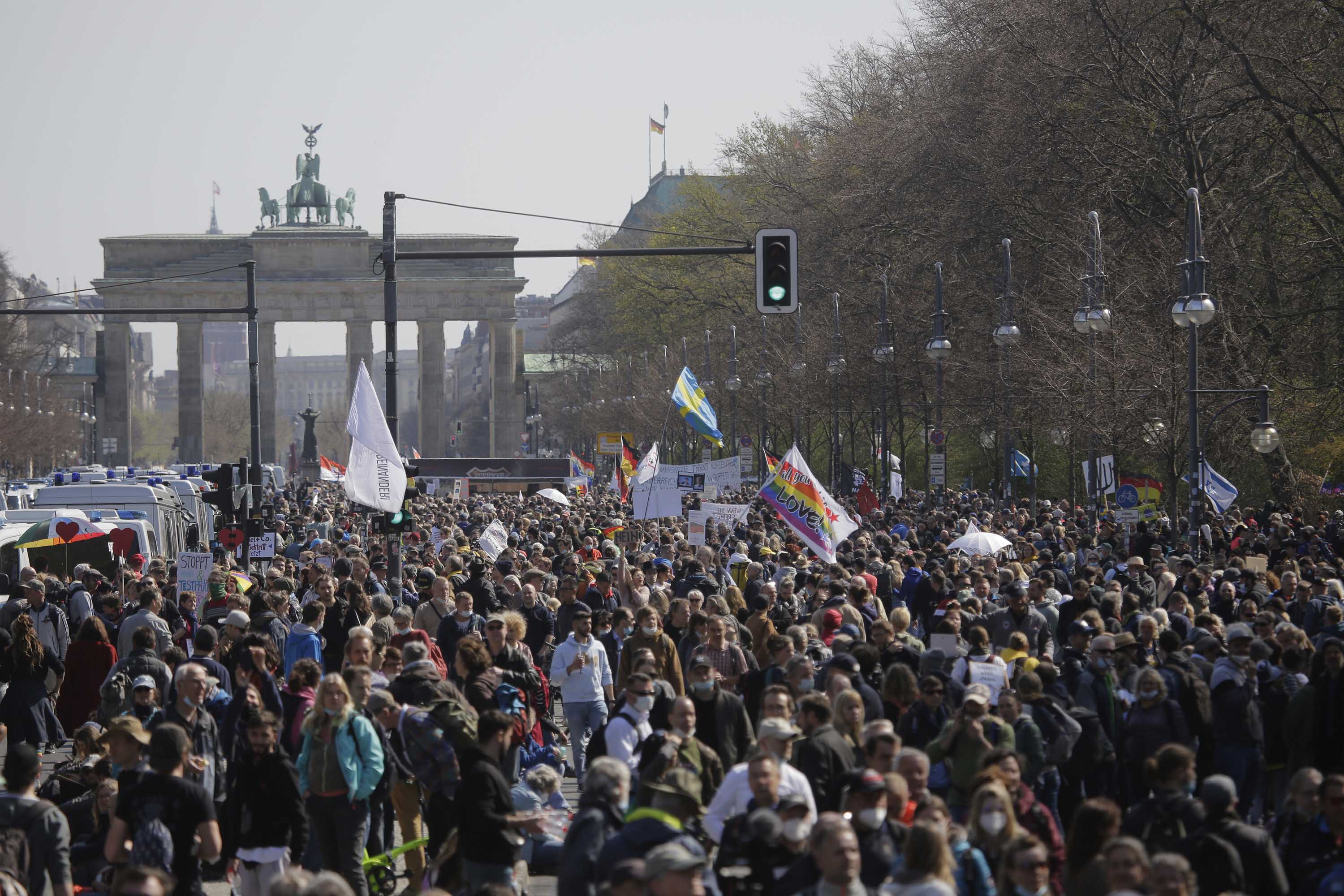
Demonstrators attend a protest rally against the government's measures to contain the coronavirus pandemic, near the Brandenburg Gate in Berlin, Germany, on Wednesday, April 21. Markus Schreiber/AP
Germany will impose lockdowns on areas with high coronavirus infection rates under new law approved by the upper house of parliament on Thursday.
The law is designed to end a patchwork approach by the country's 16 federal states, giving German Chancellor Angela Merkel's government more powers to fight a third wave of pandemic.
Germany's President Frank-Walter Steinmeier is set to sign the new legislation into law shortly.
The law — set to become effective next week or even sooner —enables Germany's government to impose curfews between 10 p.m. and 5 a.m. local time, as well as limiting private gatherings, sports and shop openings, in all areas registering more than 100 cases per 100,000 residents in one week.
Schools will close and return to online lessons if the virus incidence exceeds 165 cases per 100,000 residents.
The proposal sparked protests from opposition parties in parliament and in the capital Berlin, where hundreds took to the streets.
The new law comes into effect as Germany reaches its highest number of new Covid-19 infections since January.
On Thursday, Germany recorded an increase of 29,518 new coronavirus cases within the last 24 hours, according to data from the country's agency for disease control and prevention, the Robert Koch Institute (RKI). The reported death toll in Germany has risen by 295, bringing the death toll to 80,893.
The country is now reporting a total of 3,217,710 known Covid-19 cases and the seven-day incidence rate stood at 161.1 cases per 100,000 people.
As of Thursday, nearly 22% of Germans have now received their first dose of the coronavirus vaccine — and nearly 7% received their second coronavirus vaccine shot, the latest data from the RKI shows. German Health Minister Jens Spahn on Thursday said that he expects to offer coronavirus shots to all adults from June.
Retrieved from: https://edition.cnn.com/world/live-news/coronavirus-pandemic-vaccine-updates-04-23-21/index.html
By Bhadra Sharma

Nepal’s dethroned king, Gyanendra Shah, center, at Golden Temple in Amritsar, India, last year.Credit...Sameer Sehgal/Hindustan Times, via Getty Images
KATHMANDU, Nepal — At the beginning of this month, Nepal’s dethroned king, Gyanendra Shah, and his wife, Komal, traveled to northern India for the Kumbh Mela, a Hindu pilgrimage where millions seek a dip in the Ganges River to absolve themselves of their sins.
Gyanendra bathed in the river, and for 10 days, he and his aides mingled in crowds and met ascetics, Hindu leaders and other dignitaries. On April 18, he and Komal flew home to Nepal, where supporters welcomed them at the airport and formed a procession to escort them home, chanting pro-Hindu and pro-monarchy slogans along the way.
Three days later, the couple tested positive for the coronavirus. Now they are in quarantine at their residence in Kathmandu, the capital, while health officials in Nepal try to trace anyone who was in contact with them.
“Both king and queen have isolated themselves from other family members,” said Phani Raj Pathak, an aide to Gyanendra, who was dethroned when Nepal became a republic in 2008 and ended a two-century-old Hindu monarchy. The former ruler, who is in his 70s, retains support among some Hindus in Nepal as well as among critics of the elected government.
The infections have cast a harsh spotlight on the Kumbh Mela, where millions of Hindu pilgrims have gathered for weeks, shoulder to shoulder and often maskless, even as highly infectious variants of the coronavirus surge across South Asia. On Thursday, India reported more than 312,000 new infections, the highest daily total in any country since the pandemic began.
The Indian government has defended the gathering as safe, even as news media report thousands of infections among participants. Organizers say that attendees are required to wear masks and show proof of a negative coronavirus test, but they acknowledge that given the size of the event, many could have flouted the rules.
Now there are fears that the Kumbh Mela will cause the virus to explode in Nepal, which shares a porous border with India.
“The majority of people weren’t wearing face masks,” said Yogini Saritanandi, a pilgrim who returned to Nepal. She said she had seen “nothing other than a sea of humans on the bank of the Ganges.”
She said the authorities in the northern city of Haridwar, where the Kumbh Mela is being observed this year, began to slightly restrict entry after a few ascetics were reportedly infected and after India’s prime minister, Narendra Modi, urged organizers to observe social distancing. But it appeared to be too late.
“People got Covid one after another,” said Ms. Saritanandi, 43. “When I saw this, I thought of my 10-year-old son, and I cut my visit short to return to Nepal earlier.”
As Indian states impose new lockdowns, tens of thousands of Nepali migrant workers have returned from India without undergoing coronavirus tests. After reporting no new infections for much of January, Nepal is now averaging more than 1,100 cases a day, according to a New York Times database.
The government has closed schools and colleges in urban areas and tried to speed up vaccinations, with more than 1.7 million people having received at least one shot. But the inoculation drive was slowed after India restricted exports of vaccines to fight the outbreak at home, leaving Nepal to rely on a donation of shots from China.
· Britain found 55 more cases of the B.1.617 Covid variant first detected in India in latest weekly figures, Public Health England said.
· French prime minister Jean Castex confirmed that domestic travel restrictions will be lifted on 3 May and that secondary schools will reopen that same day. France is due to impose a 10-day quarantine starting from Saturday for travellers from Brazil, Chile, Argentina, South Africa and India.
· The Medicines and Healthcare products Regulatory Agency said there had been 168 cases up to 14 April of blood clots with low platelet counts in the UK in people who had had the Oxford/AstraZeneca coronavirus vaccine.
· EU capitals have been asked by the European commission to back legal action against AstraZeneca by the end of the week over an alleged breach of its contractual obligations to supply member states with its Covid vaccine. Earlier on Thursday, a commission spokesperson confirmed legal action had not been launched against the company, following comments by Ireland’s health minister Stephen Donnelly.
· New coronavirus cases in the Netherlands rose by more than 9,000 in 24 hours on Thursday, the highest level since early January, figures show.